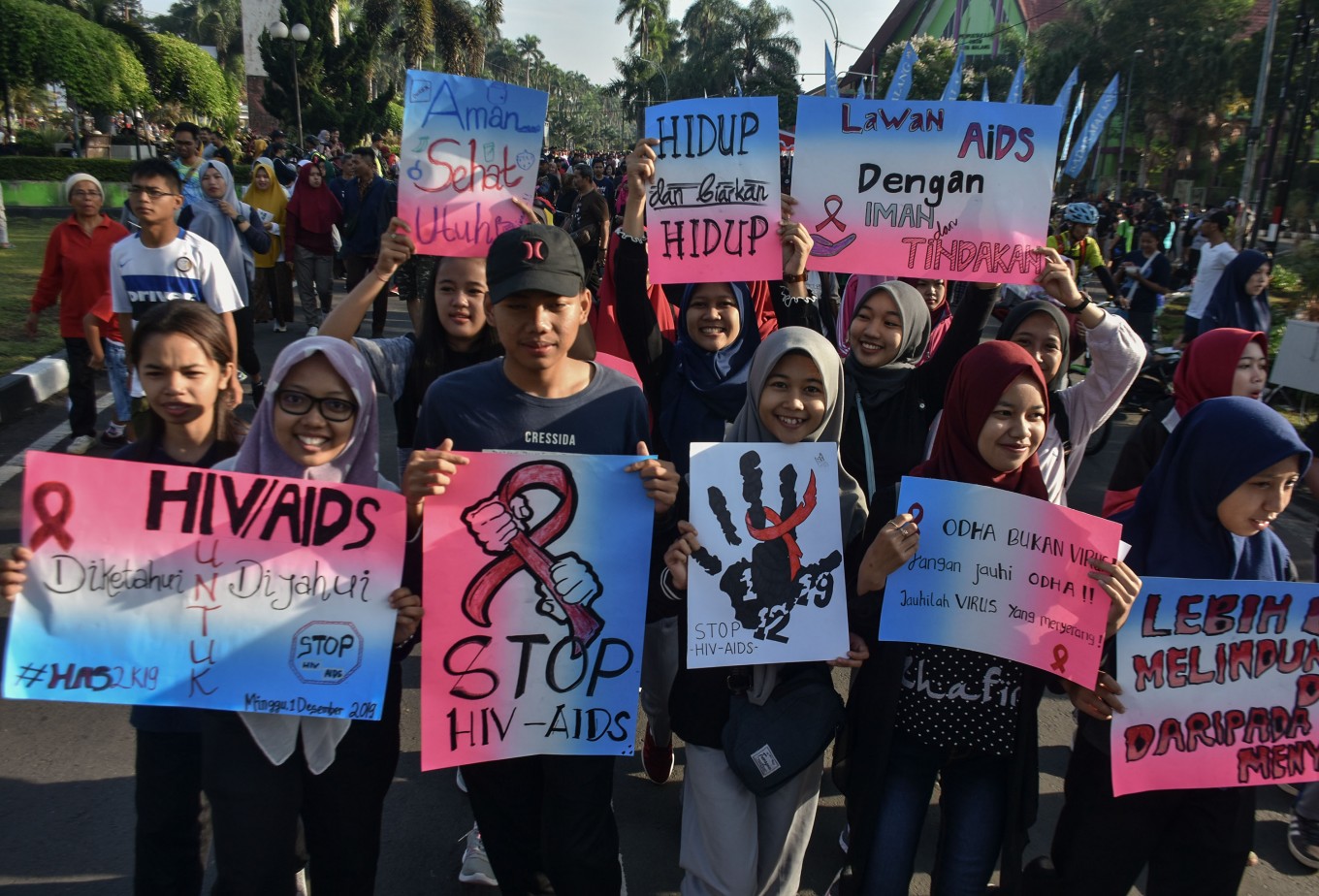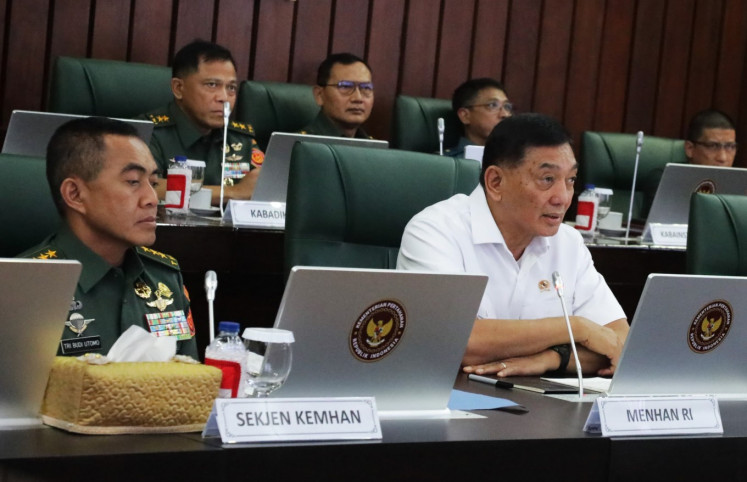Popular Reads
Top Results
Can't find what you're looking for?
View all search resultsPopular Reads
Top Results
Can't find what you're looking for?
View all search resultsJoin the youth in countering stigma of HIV/AIDS
An interconnected chain of social, political, cultural and economic factors diminishes the quality of life for people living with HIV/AIDS – particularly through persistent stigma and discrimination.
Change text size
Gift Premium Articles
to Anyone
A
s social creatures, we live and crave for connection; we have the innate need to belong. Yet, for the 640,000 over people living with HIV in Indonesia, social acceptance and blending in still seems like a distant reality. The fragile and contentious landscape of health care in Indonesia sees goals of social equality thwarted by discriminatory crackdowns on lesbian, gay, bisexual and transgender (LGBT) communities and plans for quality and accessible medical coverage pushed back by age-old preconceptions and stigmatization. The issues with Indonesian health care are especially drastic when it comes to taboo-labeled diseases like AIDS.
The human immunodeficiency virus (HIV) weakens a person’s ability to fight infections. As it targets cells of the immune system, affected persons face a declining ability to fight harmful pathogens, which could lead to later stages of infection resulting in the acquired immunodeficiency syndrome (AIDS). HIV most commonly spreads through unprotected sex with carriers of the virus and through shared needle/syringe use. However, most children get HIV from their mothers during pregnancy, at birth or through breastfeeding.
An interconnected chain of social, political, cultural and economic factors reduces the quality of life of people living with HIV/AIDS (PLHIV) including in Indonesia – particularly through persistent stigmatizing of and discrimination against PLHIV – serophobia. Cultural taboos and religious beliefs inhibit communication about sex, label sexual activity as deviant, and tie together a sense of shame and secrecy about the topic. Hence, the method of HIV transmission immediately infuses the disease with negative connotations, preventing individuals from accessing accurate information on preventive behavior, discouraging medical testing and seeking health assistance, delaying treatment and complicating therapy adherence. The stigma attached to HIV/AIDS most negatively impacts children – a demographic that had no control over their HIV status or a role in contracting the retrovirus – eliciting a dangerous environment driven by irrational negativity and fear toward them.
Just a year ago, in February 2019, a Surakarta elementary school expelled 14 HIV-positive children following backlash from parents. After hearing about students’ HIV status, parents threatened to pull their children from the school if the administration did not expel the HIV-positive students. In North Sumatra, a ban on HIV-positive orphans and children from school was also reported. Exacerbated by the combined impact of poverty, PLHIV also face difficulties paying bills, finding jobs, facing domestic violence and abuse or even buying houses.
As HIV-related stigma continues to impend HIV identification, prevention and treatment, it is high time for youth to take part in changing our social landscape a whole 180 degrees. Through spreading the word on safe sex, sex education, wellness and promoting preventive behaviors like condom use, HIV testing, engagement in HIV care, and quality of care, we can begin jumpstarting the much-needed national conversation on stigmatized illnesses. In doing so, the youth will be elevating the voices of silenced communities and begin shifting the direction of politics, reform efforts and policies to be more inclusive.
Currently, international school students from around Jakarta are making efforts to challenge the irrational fear people have toward HIV/AIDS. Last Sunday, Kampoeng Sehat volunteers from Jakarta Intercultural School, British School Jakarta and Binus School Simprug worked closely with HIV-positive children for one day by helping them boost their confidence and self-esteem in preparing a fashion show. Each volunteer teamed up with an HIV-positive child from the organization, and together they learned how to show off their model faces and strike their best poses.
From holding hands to hugging and playing together freely with the children, the international school students displayed their unwavering compassion for other people. Despite the catwalk being the simple and scalding stretch of asphalt in the organization’s compound, the laughter and confidence the student volunteers developed within the children were extraordinary. In between breaks, the children created drawings and paintings with crayons and markers. Besides the fashion show exercise, they also used art therapy to help the children develop wellness. Art therapy has been used to complement traditional mental health treatment, providing individuals with the chance to manage behavior, process feelings, reduce stress and anxiety and even increase their self-esteem. Together with the volunteers, the children expressed themselves through drawing their own SpongeBob renditions, writing about their dream jobs and coloring self-portraits.
Kampoeng Sehat, a student-run organization that I have been running since 2017, realized that if we allow this stigmatization and closed-mindedness to fester, we are silencing a group of people and neglecting their basic rights. Hence, we began collaborating with Lentera Anak Pelangi – a community-based organization that aims to reduce the burden and improve the quality of life for children born to parents with HIV/AIDS and drug users (injected drugs) in greater Jakarta. The program has four main goals: reducing the morbidity and mortality rates of HIV-positive children through health and nutritional intervention, preventing children from being marginalized because of their HIV status, developing children’s psychosocial and life skills through education as well as building a multidisciplinary intervention plan that can be mobilized by the government.
The acts of the Kampoeng Sehat volunteers challenge the Indonesian status quo and an otherwise static and lagging healthcare, education and overall sociopolitical landscape. Members of global and well-respected institutes are willing to challenge Indonesia’s irrational fear of HIV and AIDS; it’s time the general population does too!
As the world's largest Muslim democracy, sex is still widely considered taboo. Indonesia's limited view of sex education and HIV/AIDS ensues a "moral panic" that has been cited to contribute to the spread of HIV, as potential carriers avoid being identified, let alone tested. Hence, this treacherous take on HIV/AIDS requires a grassroots behavioral change from all members of the community. Besides focusing on children and parents living with HIV/AIDS, intervention must also target schools, religious and community leaders and the political system. Only then will all levels of society understand HIV/AIDS transmission and treatment, as well as join efforts to reduce and prevent discrimination of PLHIV.
***
Kaitlyn Gosakti is a senior at the Jakarta Intercultural School. She is the founder of Kampoeng Sehat, an organization that focuses on improving health care for less fortunate Jakarta residents.










